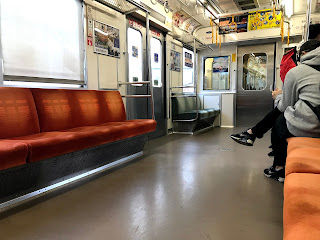I've visited on five occasions so far, the final time will be tomorrow when he's (hopefully) discharged. The journey is an hour via two to four trains—often standing—and involves numerous flights of stairs and walking about 1.5 km. I love going to see him, but the journey really takes it out of me.
Most of the trains I've been on have been okay, but on Monday I stayed for dinner and came home around 7.30pm. The first train I hopped on was not a fun experience.
My first clue it was going to be difficult was when the train arrived and no one got off. It already looked full. But people in the line in front of me literally pushed their way in and I had little choice but to push in too (the next train was unlikely to be less crowded). The lady in this photo could have been me. I had to check to make sure neither of the bags I was carrying were protruding into the space where the door was going to shut.
But that was only the start of the "fun". Standing jammed in like that is technically fine as long as either:
1. the people getting out at the next stop are next to the doors, or
2. everyone is getting out at the same stop.
But that is rarely the case in an inner-city line where there are lots of intersecting train lines (it was a different experience I described here when I headed into the city from the suburbs and almost everyone was headed for the end of the line in the city). So at the next stop I got "spewed" out onto the platform while the train disgorged itself of people who were buried deep inside and needed to exit.
Then we repeated the previous action of pushing our way back on, except that this time I got to be buried deeper inside. Which is not necessarily better.
Thankfully, though I am only 157cm high, Japanese people aren't as tall as Australians on average, and I usually get some air, but still, being jammed such as your body is touching four or five other people is not fun. You can end up in very awkward situations. I've had my hands jammed to my sides, so I couldn't reach my face, been stuck behind a lady whose long hair swept over my face and tickled my nose, and most commonly, had someone's elbow or shoulder or hip pocking into me. I am thankful that I've never experienced wandering hands, but in a situation like this, it does not surprise me that women are harassed.
 Here is a photo I took the other day at a quiet moment on my way into the hospital mid-afternoon. This is the standard layout of seats on a Tokyo commuter train. In a crowded train there is usually three lines of people standing down the middle between the people sitting down and then a tonne squeezed into that small area near the door. That's where I got stuck on Monday.
Here is a photo I took the other day at a quiet moment on my way into the hospital mid-afternoon. This is the standard layout of seats on a Tokyo commuter train. In a crowded train there is usually three lines of people standing down the middle between the people sitting down and then a tonne squeezed into that small area near the door. That's where I got stuck on Monday.The aforementioned cycle of "shoving into the train—travelling one station—people disgorging—people pushing back on the train" happened eight times in my journey of 16 minutes. I only got pushed out onto the platform once, but it was a great relief to get off the train finally and change lines to a train where I wasn't squished up against strangers nor having strangers pushed past me or pushing me so they could get onto the train. For a nation that can be characterised by generally "no touching" and "not being a bother to others", this pushing-shoving experience is quite strange.
It is all quite quiet too. Quiet enough for me to hear someone exclaim, "There's a foreigner here" when I first got on.
The other strange thing about it is how orderly this is (there are even arrows in the stations to help modulate the flow of foot traffic). Lining up, pushing on, jiggling around so we all fit, pushing off again. There's generally a quiet sense of order and no rudeness (though I have experienced rudeness beyond the general shoving required). Certainly being aware of people around you and doing your best not to take up more space than you have to is part of it. It is routine for people to wear backpacks on their fronts to take up less room.
What's interesting to note is that the culture of orderliness and taking care of others as best they can in such crowded situations on trains has spilled over into the use of elevators. My husband is in a 19-floor hospital and the elevators are very busy. They aren't as crowded as trains, but we've seen the same practice of people close to the door hopping off the elevator if someone behind them needs to exit.
Needless to say, I am glad that I don't have to commute every day in conditions like these. I will also be very happy to have my husband home again and not have to visit him in hospital again soon!










